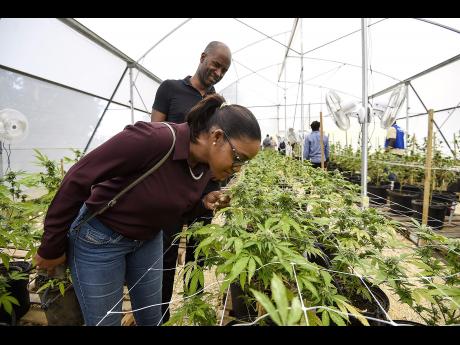Weed Ed | Navigating the banking quandary
Cash is king, and nowhere is this truer than Jamaica's emerging cannabis industry.
If you visit any of the local herb houses to purchase medical ganja, you will most likely be greeted by a 'CASH ONLY' sign. You won't find a convenient point-of-sale terminal to process credit and debit cards. In fact, the businesses don't even have an account with a local bank and can't access loans or any other banking services.
Jamaican cannabis companies are facing what other ganja businesses around the world have been experiencing: exclusion from the banking sector. This alienation stems from the Patriot Act, a controversial anti-terror law passed shortly after the September 11, 2001, attacks in the United States.
The Patriot Act prohibits US banks (and its international affiliates) from handling funds for distributors of "schedule 1" controlled substances, which includes marijuana. Since most countries' local banks route their international transactions through their US counterparts, accepting funds from a cannabis business puts both the local and international banks in breach of US law, and the powerful American banks aren't risking it.
This law played out dramatically last year when Uruguay became the first country to legalise recreational marijuana. Its industry was met with a swift and stern response from local banks, under pressure from US banks, closing the accounts of any business that sold marijuana, although it was completely legal in the country. Soon, supply couldn't match demand and consumers were forced back on to the black market.
ALTERNATIVE FINANCING
With Uruguay serving as the industry's trial subject, local cannabis companies needn't waste time and resources approaching financial institutions. Most of them have had to source capital through equity financing, which is raising funds by selling shares in the company (however, Jamaican ownership must be over 50 per cent).
Convertible Notes are a common structure used by cannabis start-ups to raise capital as it is relatively cheap, simple, and allows the company to delay negotiations around the business valuation.
Essentially, an investor provides cash to a start-up company and gets an option to convert the debt to equity (stocks) as the company grows.
This arrangement works for the entrepreneur as it is a quick, low-interest cash injection towards expansion, and company value can be deferred to a later date (usually to the next round of funding), where share price can then be established. For the investors, it is a risk worth taking as they are incentivised for providing seed funding and they get a discount on future share prices when converting to equity.
In the second round of funding, local 'weedtrepreneurs' can explore two other transaction types that are becoming more popular in the cannabis industry: streaming and royalty.
Canadian law firm Cassels Brock, which specialises in alternative financing transactions, describes them this way:
"In a typical streaming transaction, a purchaser provides an upfront deposit to a cannabis company in exchange for the right to a percentage of future production at a discounted price. The upfront deposit provides immediate funding, which can be used for infrastructure development and other capital expenditures. Similarly, a royalty transaction provides an immediate capital infusion for the cannabis company in exchange for future payments based on financial or operating metrics such as grams of cannabis produced."
Importantly, these transactions allow the company to raise needed capital without further diversifying ownership interest.
FOREIGN INVESTMENT
With the exponential growth predicted for the global industry over the next 10 years, savvy investors have been strategically setting up shop in emerging markets. Cannabis companies raised US$2.7 billion in capital in 2017, with Canada alone accounting for US$1.6 billion. No surprise, the Canadians have been ubiquitous on the local ganja landscape as Jamaica's perfect growing conditions and lower production costs are attractive proposals. Douglas Gordon, founder of CanEx Jamaica, an annual business conference and expo dedicated to the advancement of the local ganja industry, advised that entrepreneurs must prepare themselves for the opportunities ahead.
"There are some persons that have a passion for ganja but not for business. If you fall in that category, you have to fill those gaps and surround yourself with people who have the necessary skill set," said Gordon.
He added that this builds credibility and instils confidence in investors.
Industry analysts predict that when Canada legalises recreational marijuana on October 17, 2018, the balance may shift in favour of Cannabis companies. According to a report from Komoron Law, a Michigan, US-based firm that advises clients on cannabis issues, "As the first G7 nation to legalise recreational cannabis - with a powerful banking sector and close ties to the US - it's less likely that US banks or financial regulators would take action against Canadian banks, than smaller Uruguayan lenders, for financing cannabis companies".
Canadian banks could also alleviate the pressure on countries like Uruguay and Jamaica if they decided to provide their services to these countries. If all else fails, a formal arrangement between the banking sector and the cannabis industry is dependent on the US legalising marijuana at the federal level.



